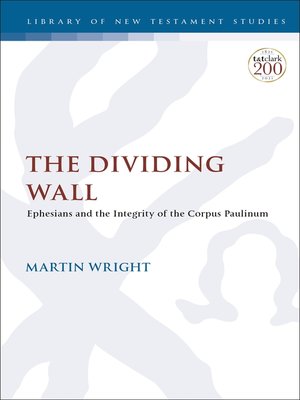The Dividing Wall
ebook ∣ Ephesians and the Integrity of the Corpus Paulinum · The Library of New Testament Studies
By Martin Wright

Sign up to save your library
With an OverDrive account, you can save your favorite libraries for at-a-glance information about availability. Find out more about OverDrive accounts.
Find this title in Libby, the library reading app by OverDrive.



Search for a digital library with this title
Title found at these libraries:
| Library Name | Distance |
|---|---|
| Loading... |
This book argues for the integrity of the Pauline Corpus as a complex, composite text. Martin Wright critiques the prevailing tendency to divide the Corpus in two, separating the undoubtedly authentic letters from those of disputed authorship. Instead, he advocates for a renewed canonical hermeneutic in which the Corpus as a whole communicates Paul's legacy, and the authorship of individual letters is less important, stressing that that current preoccupations with authorship have a distorting effect on exegesis, and need to be reconsidered.
Wright uses Ephesians as a focal text to illustrate the exegetical potential of this approach. He critically investigates the history of the prevailing hermeneutics of pseudonymity, with particular attention to the theological and confessional partiality with which it is often inflected. And constructively, he proposes a new hermeneutical model in which the Pauline Corpus is read as a continuous interpretative dialogue, leaving the question of authorship to one side. In two substantial exegetical studies, Wright offers new readings of passages from Ephesians and other Pauline letters, amplifying the proposed approach and illustrating its value.
Wright uses Ephesians as a focal text to illustrate the exegetical potential of this approach. He critically investigates the history of the prevailing hermeneutics of pseudonymity, with particular attention to the theological and confessional partiality with which it is often inflected. And constructively, he proposes a new hermeneutical model in which the Pauline Corpus is read as a continuous interpretative dialogue, leaving the question of authorship to one side. In two substantial exegetical studies, Wright offers new readings of passages from Ephesians and other Pauline letters, amplifying the proposed approach and illustrating its value.







